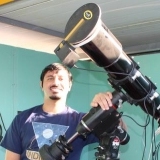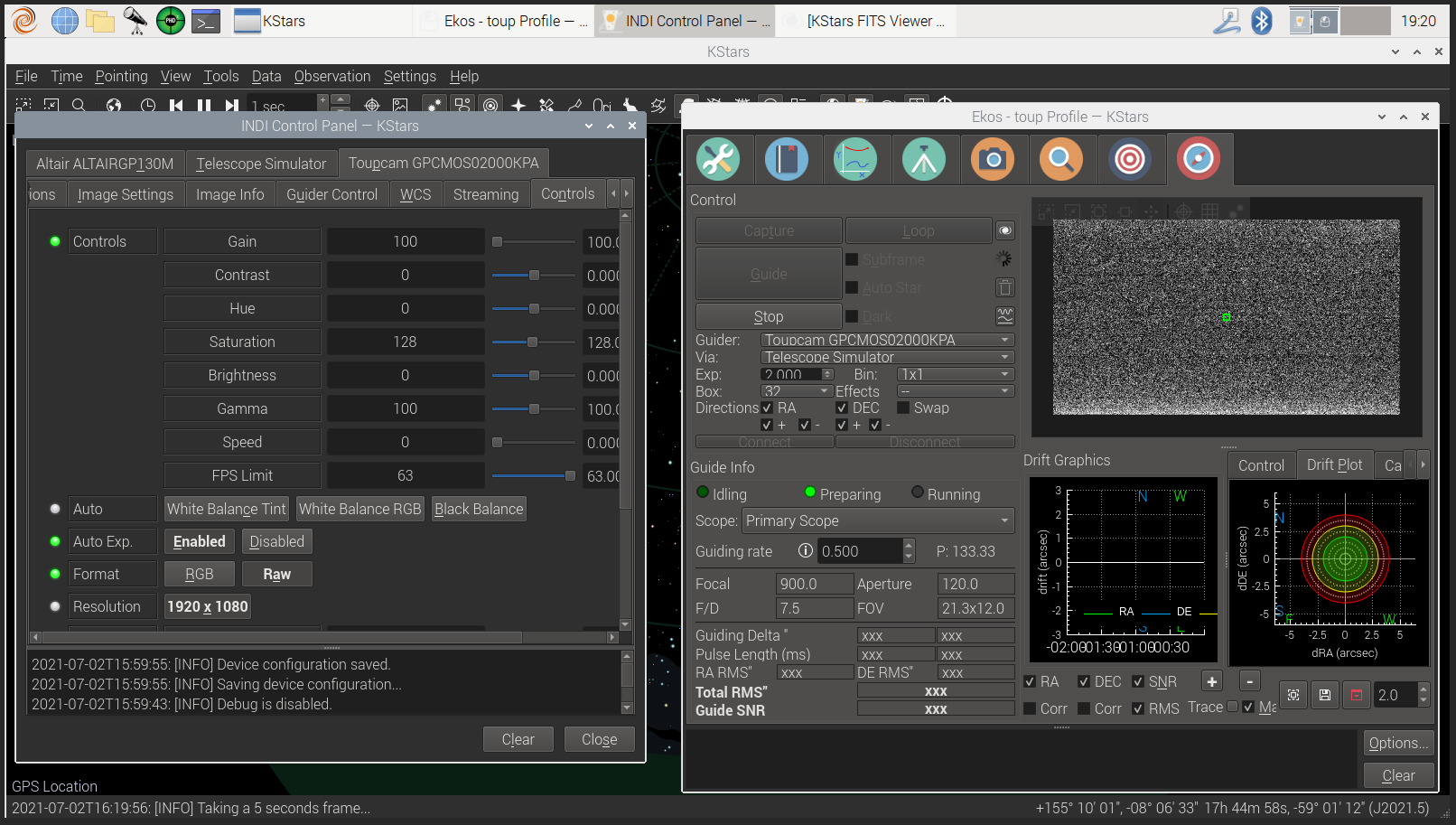INDI Library v2.0.7 is Released (01 Apr 2024)
Bi-monthly release with minor bug fixes and improvements
Omegon Pro / Touptek drivers
- Maarten Jacobs
-

- Offline
- New Member
-

- Posts: 12
- Thank you received: 3
Replied by Maarten Jacobs on topic Omegon Pro / Touptek drivers
Attachments:
Please Log in or Create an account to join the conversation.
- Jasem Mutlaq
-

- Online
- Administrator
-

Replied by Jasem Mutlaq on topic Omegon Pro / Touptek drivers
Please Log in or Create an account to join the conversation.
- Maarten Jacobs
-

- Offline
- New Member
-

- Posts: 12
- Thank you received: 3
Replied by Maarten Jacobs on topic Omegon Pro / Touptek drivers
I let it run for a bit longer now and I get a lot of exposure time outs. I add the kstars log but to me there's not much more information in it. The odd thing is that when i only connect the guide camera and a telescope simulator and ccd simulator, there is no problem and everything is rock solid. But as soon as i connect my mount, a Celestron Evolution, with a serial connection through the hand controller I get the exposure time outs. It also happens when Ekos tries to download an exposure from my Canon DSLR. When I use the guide camera with Windows and ASCOM it is rock solid all the time. I really hope you can resolve this because I love using Ekos/kstars on Stellarmate a lot. I find it the most user friendly imaging acquisition suite out there but for now it's not a reliable solution for me. If there is anything I can do to help, don't hesitate to reach out. Thanks again for all your hard work for the community.
Attachments:
Please Log in or Create an account to join the conversation.
- Maarten Jacobs
-

- Offline
- New Member
-

- Posts: 12
- Thank you received: 3
Replied by Maarten Jacobs on topic Omegon Pro / Touptek drivers
Please Log in or Create an account to join the conversation.
- Jasem Mutlaq
-

- Online
- Administrator
-

Replied by Jasem Mutlaq on topic Omegon Pro / Touptek drivers
Attachments:
Please Log in or Create an account to join the conversation.
- Maarten Jacobs
-

- Offline
- New Member
-

- Posts: 12
- Thank you received: 3
Replied by Maarten Jacobs on topic Omegon Pro / Touptek drivers
Please see my previous message. When I use Toupcam Guide Camera via the Telescope Simulator I also have no exposure time outs. But as soon as I use real mount with a usb to serial connection through the Celestron hand controller I get the time outs. Same behaviour in PHD2 on Stellarmate
Please Log in or Create an account to join the conversation.
- Jasem Mutlaq
-

- Online
- Administrator
-

Replied by Jasem Mutlaq on topic Omegon Pro / Touptek drivers
Please Log in or Create an account to join the conversation.
- Maarten Jacobs
-

- Offline
- New Member
-

- Posts: 12
- Thank you received: 3
Replied by Maarten Jacobs on topic Omegon Pro / Touptek drivers
Please Log in or Create an account to join the conversation.
Replied by Euripides on topic Re:Omegon Pro / Touptek drivers
Reading that, I would bet that something is going on with the mount or the mount driver.
Something odd, but my troubleshooting steps would be :
1. Run PHD2 and connect only the cam, not the mount. Do you still have time outs?
2. I would create a fresh SD card with Astroberry or with AstroPi3 script, and run try again with the mount connected. Do you still have time outs?
Sent from my iPad using Tapatalk
Please Log in or Create an account to join the conversation.
- Wiktor Latanowicz
-

- Offline
- New Member
-

- Posts: 2
- Thank you received: 3
Replied by Wiktor Latanowicz on topic Omegon Pro / Touptek drivers
Please Log in or Create an account to join the conversation.
- Maarten Jacobs
-

- Offline
- New Member
-

- Posts: 12
- Thank you received: 3
Replied by Maarten Jacobs on topic Omegon Pro / Touptek drivers
Please Log in or Create an account to join the conversation.
Replied by Hartmut on topic Omegon Pro / Touptek drivers
I'm using a veTEC533c with Astroberry & Stellarmate via RPi4 USB3 port.
Additionally I'm using a ZWO ASI120MC-S connected via USB-3 cable to the veTEC USB-2.0 HUB.
The veTEC is powered by external 12V.
This works great and as expected using the internal Guider, not PHD2.
Now I want to exchange the ASI120MC-S by a veTEC GUIDE 2000M (has an USB2.0 Port).
Could the above stated problem also occure if using the "Internal Guider" or is is only related to the usage of PHD2?
Cheers
Hardy
Please Log in or Create an account to join the conversation.


